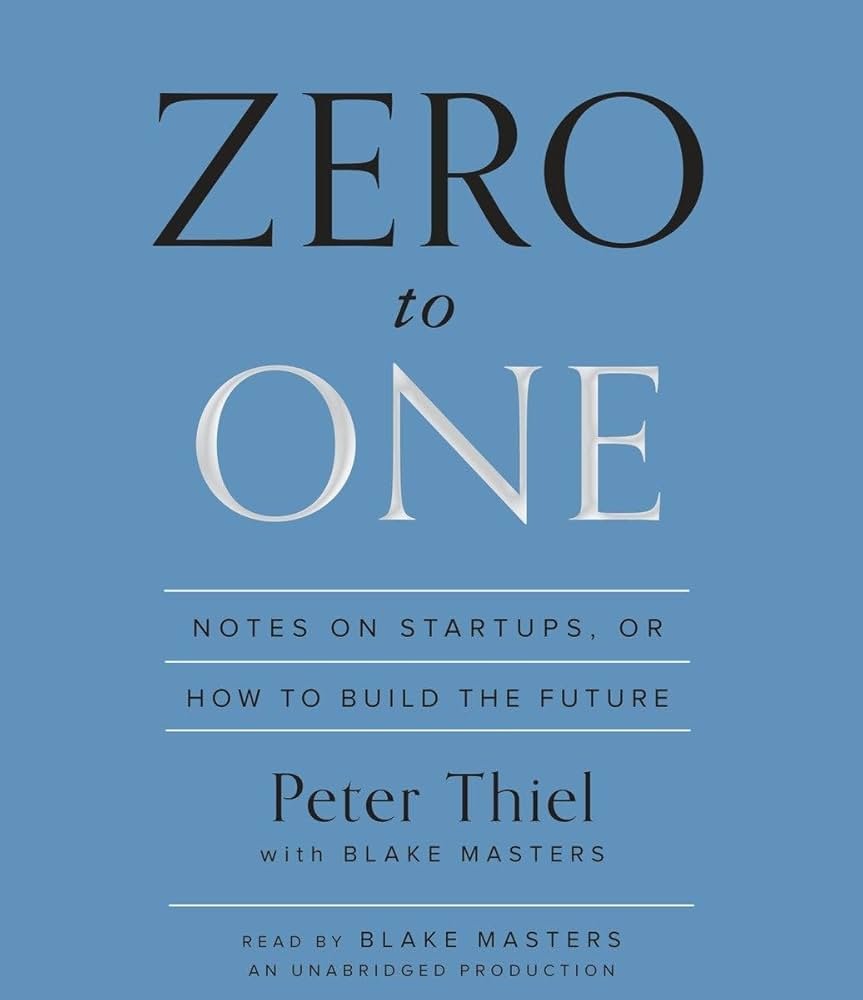Zero to One - Peter theil

Zero To One: The 3 Big Ideas
In his book, Zero to One, Peter Thiel discusses his philosophy on what it takes to be a successful startup. He doesn't subscribe to many notions that Silicon Valley holds on to with a firm hands. It's a refreshing take, and gives us a glimpse into the mind of a visionary.
Noteworthy Quote : " As you craft a plan to expand, don't disrupt: avoid competition as much as possible. "
Going From Zero To One
Thiel's first important lesson is to understand the distinction between "Zero to One" and "One to N". Going from Zero to One entails creating something new — something that doesn't exist yet.
However, when you go from One to N, you're improving or scaling something that already exists.
Peter Thiel points out that the key differentiator is that the former is a Vertical Progress (Zero to One) while the latter is Horizontal Progress (One to N).
Theil stresses that he key to vertical progress lies in being a visionary and making a bet on the future.
My Thoughts: Theil is essentially distinguishing between a startup entering a New Market versus a startup that enters an existing market. I discuss the key differences in an animated post: 3 Types Of Markets. Peter places this idea before us in an effort to ramp up to his next key idea: Competition is bad.
Competition Is For Losers
Here's where some people may raise eyebrows. Peter, however, does back his statements with insights that would make the reader ponder. The author states that companies should avoid competition if they choose to maximize profits.
"Under perfect competition, in the long run, no company makes an economic profit". Essentially, if you build a product and enter into competition - prices will drop, sales will be divided and overall profits will thin.
Hence, it's the startup's best interest to avoid competition altogether.
Thiel also notes that it's in a consumer's best interest for a startup to achieve a monopoly. Since it would mean that the product is so good, that others cannot compete.
Google, for example, has achieved a monopoly as the word's most used Search Engine and consumers love it. For a new startup to displace Google and achieve a monopoly, it would have to be 10x better - which in turn, would be in the best interests of the consumers once again.
My Thoughts: The word 'monopoly' has garnered a stigma over the years. We think of large & evil corporations who would go to any means necessary to milk every dime out of the public — while shutting out it's competition. But Peter Thiel isn't referring to monopoly via abuse & power. Theil is referring to monopoly via proprietary technology (Google's Page Rank) , network effects (Uber pushing out competition) and Branding (Apple). Achieving this requires innovation, and hence he concludes that monopoly drives innovation.
The Contrarian Question & Vision
One of the best ways to go from Zero to One is to ask the Contrarian Question. Essentially, Peter Thiel is asking us to ask questions that are contrary to popular beliefs.
The one important question is to ask yourself "What important truths to few people agree with you on?"
If this truth is important enough to you to bring to a reality, then you have a vision. This vision will let you take the world from Zero to One.
Don't focus too much on trying to learn from your competitors and customer feedback. Waiting for information will slow down the building process. Instead, you should focus all your time on your vision.
My Thoughts: Peter Thiel's view on a strong vision may seem contrary to the popular methodologies touted by the likes of Eric Reis (The Lean Startup). One hand, the entire Zero To One summary is filled with the contrarian views of Peter Thiel. But on the other hand, the Lean Startup advocates being true to your vision but flexible in your path to the vision. So ultimately, they advocate the same goal. Peter Thiel, however, seems to have a more confident (or arrogant?) approach to product development.
Zero To One - Final Thoughts
Zero to One is filled with the contrarian beliefs of an innovator who has truly taken the world from Zero to One. However, I can't help but doubt the validity to some of the claims & examples used. The book had me pondering, but not entirely convinced. Thiel's view on competition left me skeptical.
Should entrepreneurs stay away from competition? Or is competition the first step towards monopoly?
After all, Facebook did compete with MySpace to get to where it is today. Granted, Facebook did achieve its monopoly by being the 10x better product. But would Mark Zuckerberg have pursued his venture if he had heeded the advice of Thiel?
Peter Thiel employs Google as his poster boy to support his notions on monopoly. However, the author fails to note that Google themselves had a rough patch when they got too big. Founder Larry Page had to step back in and reinstitute Google's entrepreneurial mindset.
At the end of the day, humans seem function best on incentive. If entrepreneurs stay away from competition, what would incentivize a corporation to keep innovating? In an ideal world, a company would use their increased profits to further mankind. But - alas - we don't live in an ideal world.